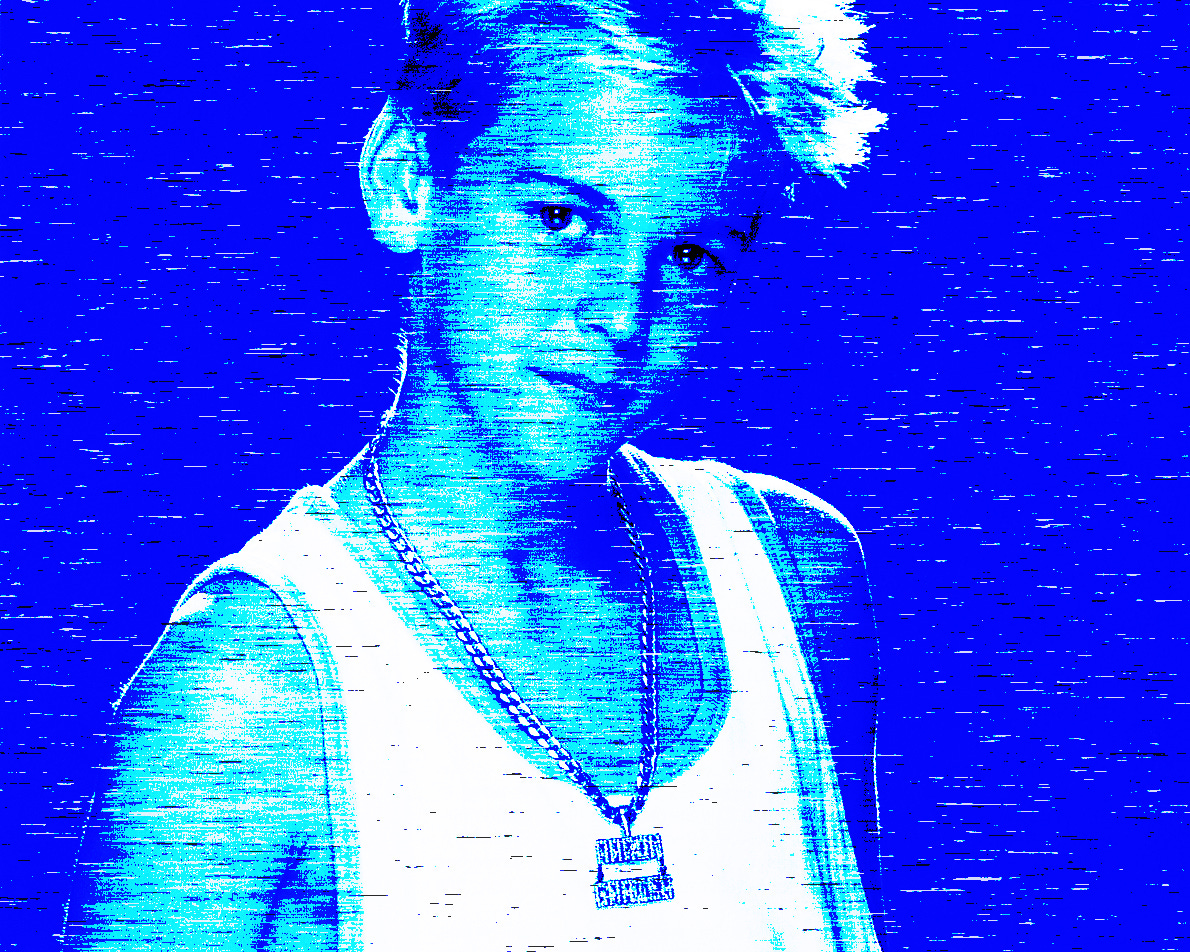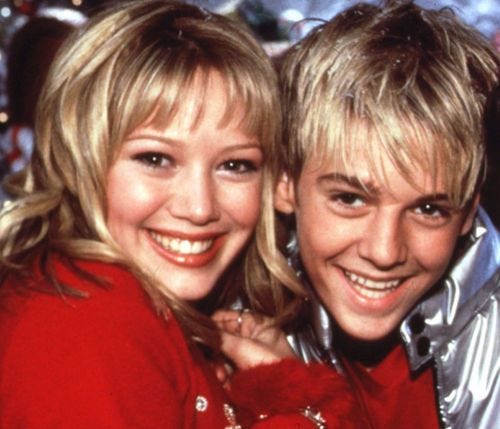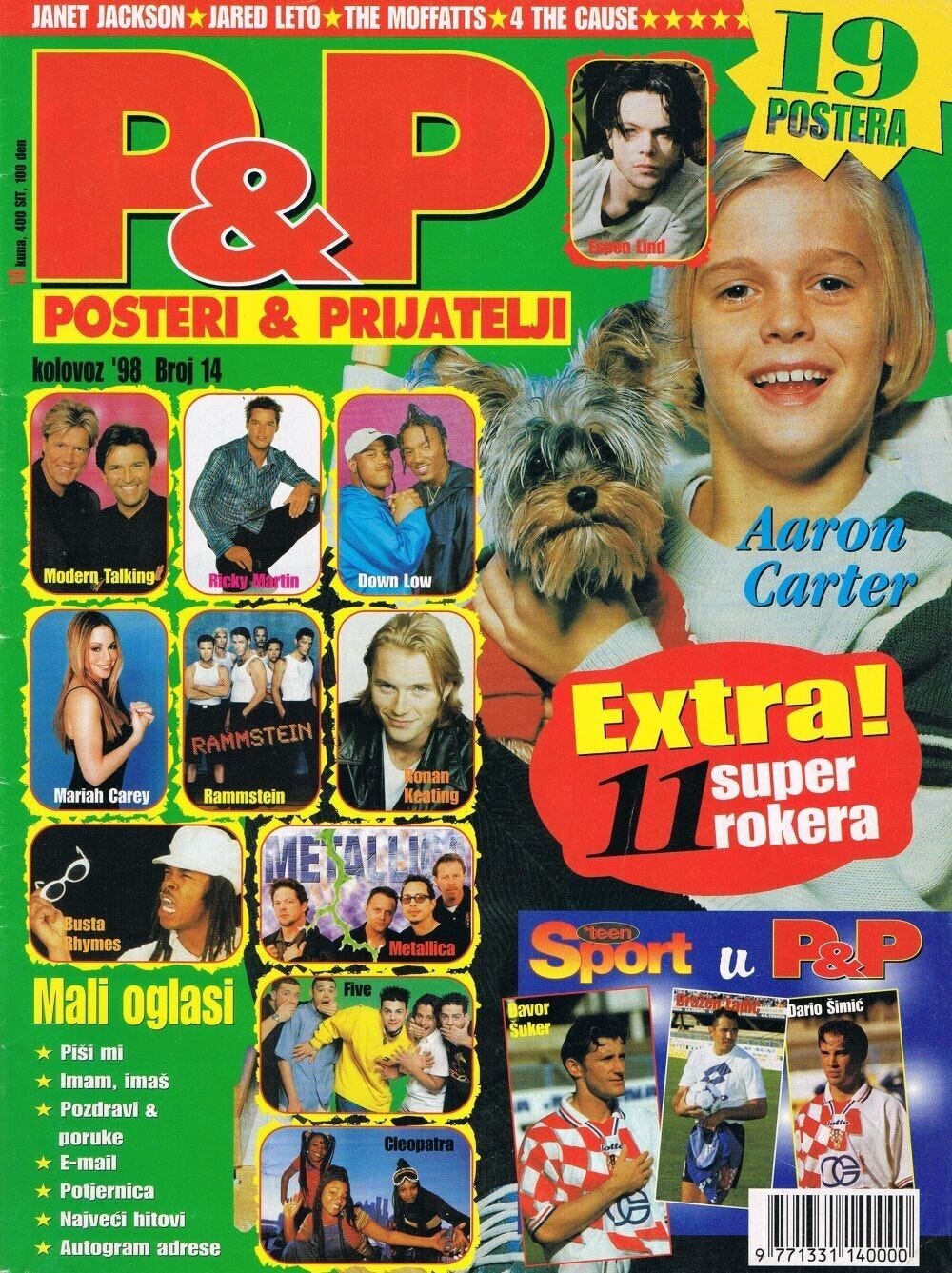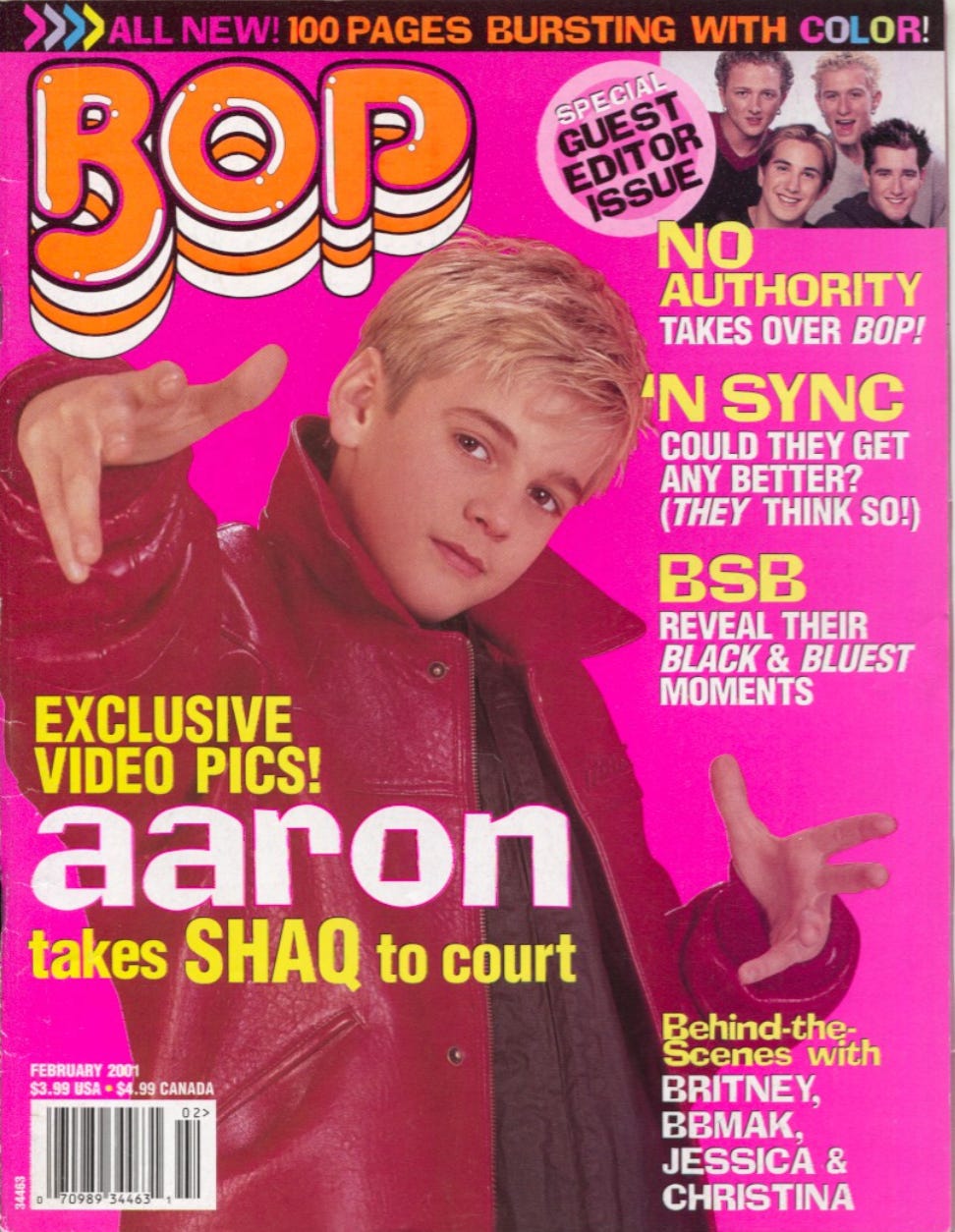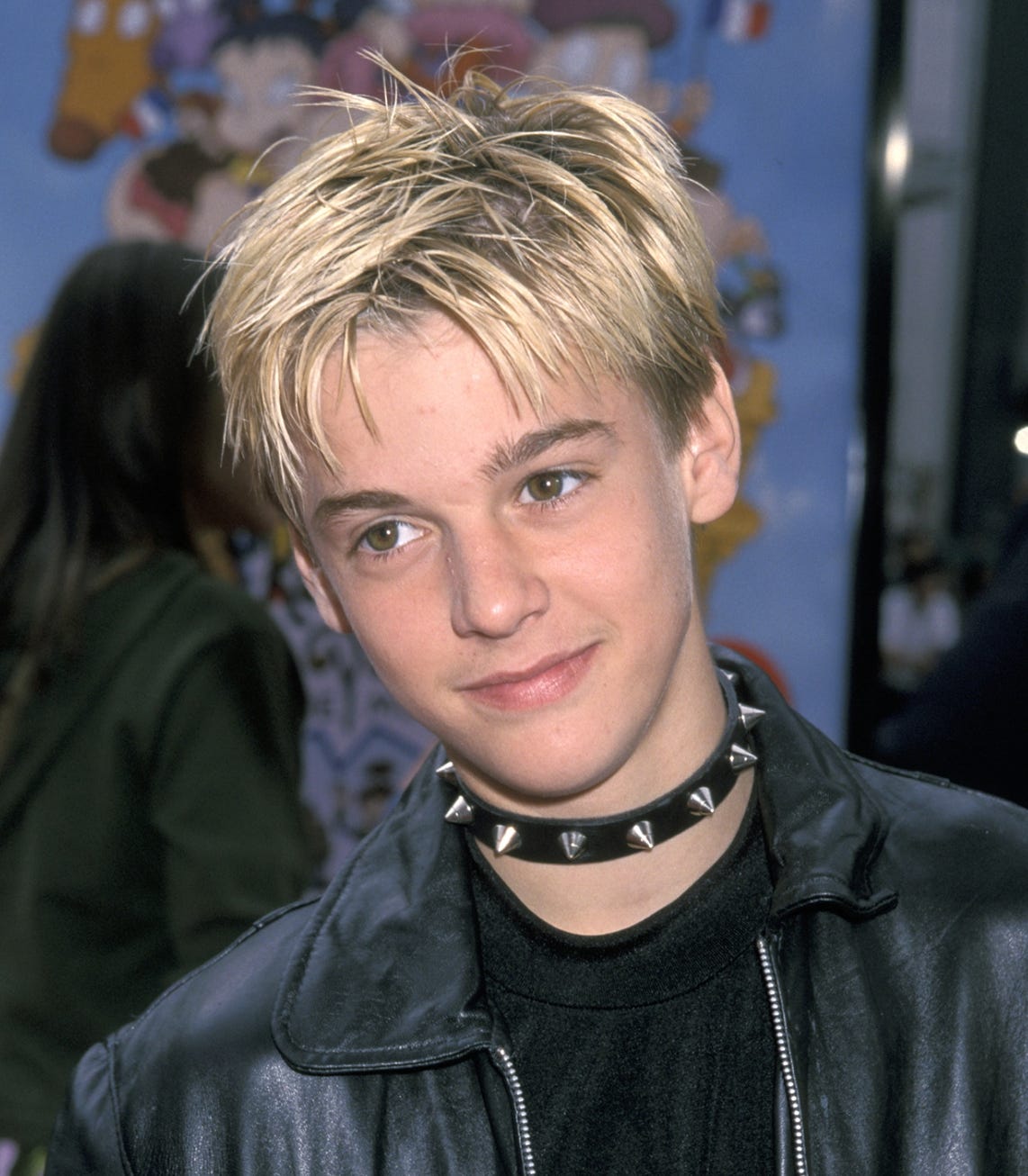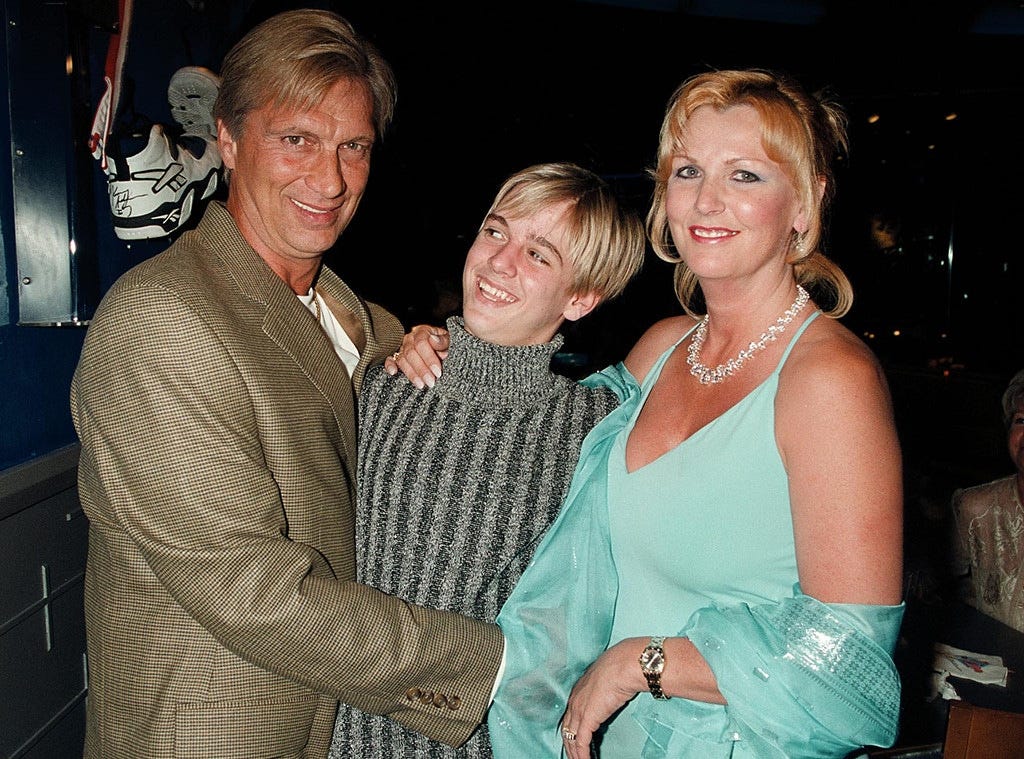The Impossible Task of Understanding Aaron Carter
The first installment of a multi-part series exploring the rabbit hole that was Aaron Carter's reality.
On November 5, 2022, former pop star Aaron Carter was found dead in his bathtub. To the millions that remembered him as an impish kid who ruled radiowaves for a short spurt of the 2000s, the sudden death came as a surprise. For the few that kept tabs on his frequently unhinged live streams and television cameos over the final years of his life, the singer’s demise seemed inevitable. But the loss left just about everyone wondering the same thing: “What happened?”
As it turns out, the answer to that simple two-word question is anything but simple.
Straight away, a reporter named Andy Symonds tried offer an explanation in the form of the late artist’s fragmentary memoirs. Just ten days after the death, Symonds tried to release some of the elusory details of the late star’s life in a book titled My Father’s Son: The Incomplete Memoirs of an Incomplete Life.
As one might expect, the publicity stunt garnered Symonds immediate backlash. The decision to publish less than two weeks after the death understandingly came off as callous. Buzz around the project grew sleazier still after conflicting reports surfaced regarding whether Aaron Carter actually wanted the memoirs published at all.
Carter’s loved ones and managers promptly denounced the memoir, and the publication of My Father’s Son has been postponed indefinitely. But Aaron’s family and business associates weren’t the only ones to slam Symonds.
Concerning the memoirs, actress Hillary Duff gave the following statement to the Daily Mail:
“To water down Aaron’s life story to what seems to be unverified click-bait for profit is disgusting…in no way do I condone shedding any light on what is so obviously an uninformed, heartless, money grab.”
As many Millenials likely remember, Duff and Carter were an on-again-off-again item from 2000 to 2003. Infamously, Carter cheated on Duff with actress Lindsay Lohan, creating a love triangle exacerbated by paparazzi hounding the teenage celebrities. Decades after the debacle, promotional excerpts for Symonds’ publication promised details of a 13-year-old Duff losing her virginity to Carter.
Duff’s criticisms are understandable because trying to promote a dead celebrity’s memoirs by teasing audiences with the particulars of a teenage girl’s most intimate moments is objectively gross. But divorced from how justified Duff’s complaint is, the choice of words in her brief statement piqued my interest.
Words like “unverified” and “uninformed” suggest that Symonds did not properly fact-check his work and imply that the claims included in the memoir aren’t true (or, at best, are incomplete truths). If Duff is being truthful, two possible scenarios explain the presence of the false information:
Scenario A: Symonds, independent of Aaron, made up his own narrative about the Carter-Duff romance in hopes of garnering more readers and publicity, knowingly putting himself at risk for potential libel suits
Scenario B: Aaron Carter himself exaggerated (or flat-out lied) about the details of his relationship with Hillary, which he then shared with Symonds as the truth.
As questionable as Symonds’ decisions surrounding the memoirs may have been, I’m personally inclined to believe scenario B simply because, in life, Aaron lied constantly. Some of the more sensational statements Carter has claimed include:
That he had clones commissioned of his German Shepard dog, Zelda
That his hands had been cut off (and subsequently surgically reattached)
That his brother, Nick Carter, had once buried him alive
That Nick Carter, on another occasion, stranded him on a desert island with “nothing but a water bottle”.
That at age 19, doctors diagnosed him with the “insides of a 90-year-old man” (he never elaborated on what he meant by this exactly)
That his stepmother murdered both his sister Leslie and his father
That he was secretly a billionaire
A little bit of digging led me to a comprehensive interview with journalist DJ Vlad, who questioned Aaron about his teenage romance with Duff. Carter responded, “I don’t know if dating at 13 years old is a thing. I mean, what were we doing? Playing Snake on our iPhones1 and building Legos together? It was just kid’s stuff.”
Of course, this statement directly conflicts with Symonds' accounts, which sparks a few questions. Which version of the relationship between Aaron and Hillary reflects what actually happened? Were Duff and Carter actually a significant part of each other’s teenage lives, or was it just a case of middle-school puppy love blown out of proportion by fans and publicists?
To be clear, I’m not particularly interested in the veracity of some sexual experimentation that may or may not have happened between a couple of 13-year-old kids two decades ago. However, this particular anecdote perfectly illustrates the consistent inconsistencies that crop up again and again when piecing together Aaron Carter’s life. Toward the end, when media coverage died down and all observers had left were the words of the unreliable narrator himself, deciphering the line between fantasy and reality became damn near impossible. If anything, the attempts Aaron made to elaborate on just about any detail of his short life offered more questions than answers.
Between tabloid speculations, familial assertations, and the conjecture of virtual fandoms following every step of Aaron Carter’s descent, how did the truth become so terribly tangled? How did Aaron, the Justin Beiber prototype and object of affection for countless lovesick prepubescent kids entering an uncertain new millennium, meet such a dark fate?
Through the imperfect virtual vestiges he left behind after death, this series aims to find out.
Aaron’s life path has always been intrinsically entwined with the path of his older brother, Nick Carter. In order to begin to understand Aaron, you first need to delve into Nick.
And in order to talk about Nick, we need to start with Lou Pearlman.
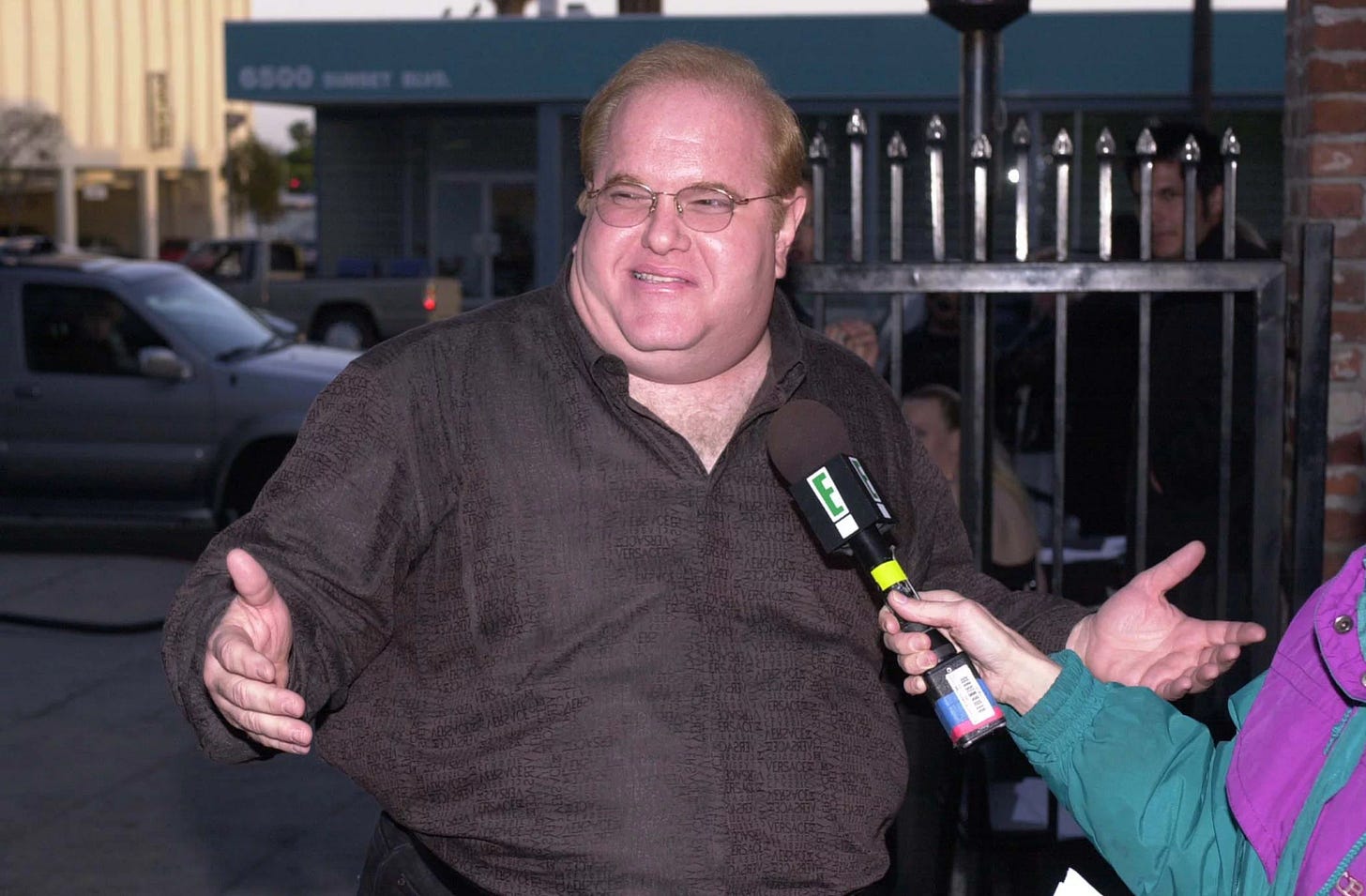
A balding blimp-enthusiast from Queens, it’s difficult to comprehend at a glance how a man like Lou Pearlman could have possibly been the mastermind that catapulted the Carter brothers into superstardom. But in the early 90s, the middle-aged aviation entrepreneur started paying close attention to the first wave of boy bands to top American pop music charts. By chance, OG boy band sensation New Kids on the Block chartered a luxury jet from Pearlman worth $250,000 USD per month. After this brush with fame, Pearlman quickly surmised just how lucrative such an act could be. By 1992, he had shifted his attention from planes to pop stars. Seeking malleable young talent that he could call his own, Pearlman held open talent auditions at a blimp hangar in Kissimmee, FL.
It was there that a thirteen-year-old Nick Carter would meet his future producer.
After hearing Nick absentmindedly sing a rendition of “Bridge Over Troubled Water” to a pretend audience at age eight, family matriarch Jane Carter became hellbent on making her eldest son a star. As a working-class family, the Carters didn’t have the advantage of knowing the people or practices of the entertainment industry. But Jane had the sort of blind faith in Nick’s abilities that only a mother could have for her son. So, despite the family’s limited finances, Jane and Robert would tirelessly cart their son from talent shows to commercial auditions across the state of Florida.
Over time, unfamiliar audiences unencumbered by parental horse-blinders began recognizing Nick’s talent. When the boy snagged a starring role in his elementary school’s production of Phantom of the Opera2, the fourth grader’s performance was reportedly so powerful that adults in attendance were moved to tears. By the time Nick reached his teens, he had completed countless hours of song and dance lessons. A big break seemed inevitable.
If ever there was a person destined to become the youngest member of the Backstreet Boys, it was Nick. And shortly after stepping into that Kissimmee blimp hangar, that’s exactly what happened to him.
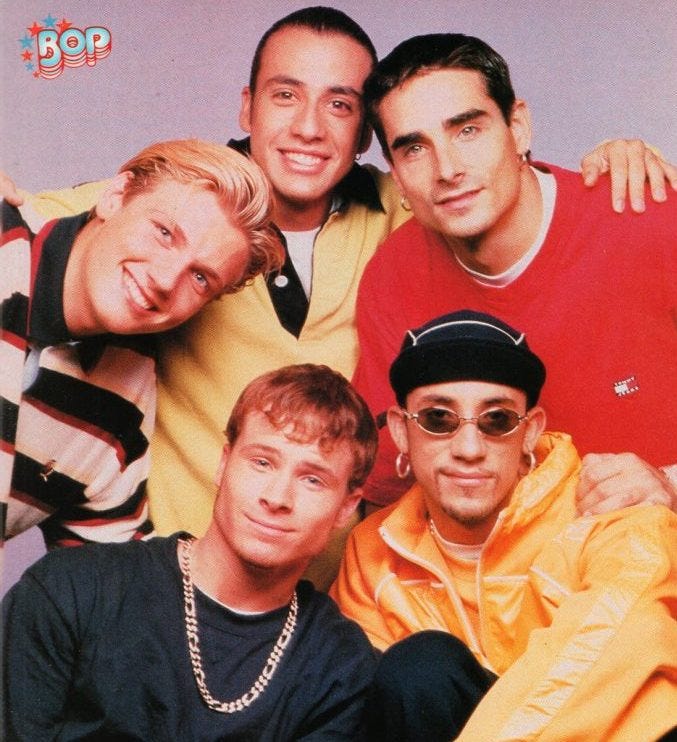
Just a few weeks after Pearlman finalized the Backstreet Boys lineup, he used his personal assets to start sending the band to shopping malls and high schools across the United States to generate the first flickers of a fanbase. Pearlman then connected Backstreet with Swedish songwriter and record producer Max Martin3. When the boy's debut single "We’ve Got It Goin’ On” dropped in 1995, it secured a spot at the top of the Eurochart Hot 100. This, in turn, catapulted the Backstreet Boys into international stardom at warp speed. Blonde-haired blue-eyed baby-faced Nick was increasingly marketed as the “cutest” member of Backstreet, and before hitting 16, he was the fixation of millions of nameless preteen girls.
(If you appreciate works like this but aren’t necessarily interested in upgrading to a paid subscription, please consider buying me a coffee – this series didn’t write itself!)
Almost eight years younger than Nick, Aaron Carter’s first lasting memories likely revolved around the emerging Backstreet Boys mania. Around the same time that Nick cemented a spot in the boy band, six-year-old Aaron started taking classes at Tampa’s Paragon Music School. Without a doubt, the Carter family was hopeful that Nick’s talent had some hereditary component to it, and that their youngest son would soon prove himself to be an equally talented child prodigy.
From the beginning, Aaron did everything he could to live up to the extremely unrealistic expectations placed upon him. As hard as it is to imagine from a small child, Carter became the lead singer of a punk band called Dead End almost as soon as he learned the basic fundamentals of song and performance. As Backstreet’s popularity increased, Aaron was allowed to spend time watching Nick and his bandmates record in the studio. Looking to his brother as a role model, Aaron’s aspirations unsurprisingly shifted from the prepubescent punk scene to pop.
Lou Pearlman, all too aware of the vulnerability and marketability of a Backstreet Boy’s little brother, took nine-year-old Aaron under his wing. On Pearlman’s dime, Aaron was promptly sent to the studio to record his first single, an impossibly squeaky cover of The Jets 1986 hit “Crush on You”.
According to Carter, his first concert was scheduled for the following evening. Some years later, both Pearlman and Nick Carter would reveal that the decision to have Aaron open for a 50,000-person Backstreet Boys concert in Berlin, was meant to be “a joke”. But instead of giving a cute but laughable performance, the boy quite literally stumbled into celebrity overnight. European audiences loved the youngest Carter. Immediately, he earned himself a record deal. By November 1997, Aaron’s debut international album was recorded and released.
Coincidentally, 1997 also proved to be a pivotal year for the Backstreet Boys. Though they’d become popular throughout Europe, Canada, and Asia, for years an audience from their home country eluded them. But when the band released their first compilation album (which combined hits from their self-titled debut and Backstreet’s Back), they finally gained some traction. After promoting themselves on MTV, Nickelodeon, SNL, and even daytime talk shows, the album went certified platinum 14x over. In January 1998, the album peaked at the number four slot on Billboard – creating the perfect opportunity for little Aaron to introduce himself to thousands of newfound Nick Carter fanatics.
Unfortunately, away from the stage, tensions were brewing among the Backstreet Boys. The band was overbooked and worked to the point of exhaustion. In 1998 NSYNC burst onto the scene, all too eager to lap up the Boy’s sloppy seconds. At this time, Backstreet learned that manager Lou Pearlman actually formed and funded NSYNC himself, hoping to artificially create a Pepsi/Coke-esque rivalry between the bands. Understandably, Backstreet felt betrayed.
Things got worse when band member Brian Littrell hired a lawyer to inquire, why, after long hours of rehearsing and performing, he was earning less than a minimum wage salary annually. Legal proceedings revealed that Pearlman was collecting as manager, producer, and as “a sixth member of the band” (pocketing 1/6 of the band’s combined income). At this point, Backstreet cut ties with Pearlman legally. NSYNC, who experienced similar issues, followed suit before the release of their second album, No Strings Attached.
But for reasons that aren’t entirely clear, Aaron stuck by Lou’s side.
Perhaps the questionable decision to continue working with Pearlman can be traced back to the quickly deteriorating relationship between Nick and his family. Jane Carter, once Nick’s biggest supporter, was pushed out of her eldest son’s affairs when she became more of a domineering manager than a doting mother. Hurt by what she perceived as a betrayal, Jane poured herself into Aaron’s budding career and began drinking heavily. Because Jane managed Aaron, Nick – the person in Aaron’s life most familiar with Pearlman’s shady practices – became increasingly distant from his little brother.
Aaron, too young to properly manage (or even access) his finances, would have had no way of knowing whether a contract he signed was crooked, or whether he was being cheated out of his assets. The legal scandals surrounding Pearlman went over Aaron’s head because, despite international fame, Carter was still at his core a kid mostly concerned with collecting Beanie Babies. At a time when other adults in Aaron’s life were erratic and unreliable, Lou was jovial and generous – so long as you didn’t cross him. Nicknamed “Big Poppa”, Pearlman became nothing short of a father figure for Aaron.
Of course, the close relationship was a carefully calculated move on Pearlman’s part. Though the Pearlman would go on to create (and swindle) other acts such as O-Town and LFO, Aaron became the producer’s prized “cash cow” after the departure of the Backstreet Boys and NSYNC. In other words, Pearlman was willing to spin whatever lies necessary to keep Aaron under his control.
Even in those early years, it was evident to anyone paying close attention that trouble brewed in Aaron’s future. But in the brief moments before the world came crashing down, Carter reached incomprehensible heights.
Arguably, the best time to be a Carter came in the year 2000.
During that first spring of the new century, the Backstreet Boys released their third studio album. Fittingly titled Millenium, the album featured chart-dominating hits like “Larger than Life” and “I Want It That Way”. Backstreet officially became a household name. And at the center of the worldwide hullabaloo was Aaron’s big brother, Nick.
This attention, of course, marked the perfect opportunity for Aaron make a move of his own4. Just a few months after the release of Millenium, Aaron springboarded off of Backstreet’s successes and released his sophomore album: Aaron’s Party (Come Get It).
Without a doubt, Aaron’s Party was the greatest commercial success of Aaron Carter’s career. In the US alone, the album sold over 3 million copies. None of this is to say that Aaron’s Party is a good album. An AllMusic review by Jon Azpuri described it as “a painful blend of facile synth-pop mixed with sanitized, suburban hip-hop jargon” and “the sort of album you look back on years after its release and mock with ironic glee”. David Browne of Entertainment Weekly labeled it “childish…overproduced clatter”.
But none of that really mattered. Aaron Carter’s popularity never depended on his musical merits. Instead, much of the hype around Aaron revolved around the brand he represented. Though he may not have inherited Nick’s ability to effortlessly churn out hits, the physical resemblance between the Carter brothers was apparent. In fact, Aaron was arguably even cuter than the “cutest” Backstreet Boy – his face was softer, his smile more infectious, his demeanor more carefree. Nick was a sensational talent, easily admired but much too far out of reach for his youngest fans to seriously direct their affections. Mischievous Aaron, on the other hand, was accessible and attainable for puerile pop-loving girls5.
Being a Carter was always the hook, but Aaron’s charisma ultimately won over swarms of fans he could call his own. He was the sort of kid that vaguely resembled your first elementary school crush, a sensitive yet playful package topped off with a crown of perfectly tousled blonde hair. If a mad scientist was tasked with creating a preteen optimized to steal the hearts of as many children in the 8-12 age bracket as possible, Aaron Carter would be the creature to emerge from the laboratory.
And so, kitschy singles like “How I Beat Shaq” and “I Want Candy” received heavy rotation on major platforms like Radio Disney and Nickelodeon. By the end of the year 2000, everyone knew Aaron. Kid-centric films like Jimmy Neutron: Boy Genius, Rugrats in Paris, and Pokemon: The First Movie all wanted Aaron to contribute to their soundtracks. After appearing on an episode of Disney’s Lizzie McGuire, he entered a high-profile relationship with the show’s star sweetheart, Hillary Duff.
Before there was any time to catch his breath, Aaron wrapped up a third album titled Oh Aaron. While not quite as commercially successful as his previous album, the young artist remained wildly popular with young audiences. To keep up with demand, Aaron spent most of 2001 and 2002 touring across the US and living out of hotel rooms.
As taxing as that sounds, things mostly seemed to be pretty good for Aaron in those days. Seemingly, he had everything he could possibly want: international recognition, famous girlfriends, and a life where price tags weren’t a concern.
But Aaron’s fantastical world was too fragile to survive the harsh, inescapable realities that loomed on the horizon. He was always predestined to fall – and unsurprisingly, nothing was set in place to cushion the inevitable impact.
The decline started just before the release of Aaron’s fourth album, Another Earthquake.
Though still too young to understand the specifics, around the year 2002 Aaron began to realize that his professional relationship with Lou Pearlman was an uneven one. In fact, the contract Aaron signed with Pearlman at age nine specified that two-thirds of all revenues generated by Carter should go to his producer. So, like his brother had several years beforehand, Aaron cut ties and filed a lawsuit against Lou Pearlman. Though the teenager claimed that he had been cheated out of hundreds of thousands of dollars, Pearlman ultimately settled the case out of court for an undisclosed amount.
This should have marked a new, brighter moment in Carter’s career. But escaping Pearlman’s control came at a price – Aaron no longer had the seemingly unlimited finances and business acumen Lou had to offer. In order to fill the void left behind by Lou, Aaron turned to help from his parents.
Sadly, Aaron’s parents may have been the worst possible candidates to turn to for help in managing Aaron’s career.
Almost immediately after Pearlman’s departure, Aaron was forced to grapple with the rapidly crumbling remnants of his parents’ failing marriage. To be fair, Jane and Robert Carter were never what one might consider a functional couple. Nick cites in his memoir that fights erupted long before any of the fame and fortune, mostly over the cost of song and dance lessons. Other accounts from Nick (and his oft-forgotten sisters) claim that Jane and Robert would burst into the children’s rooms and demand to know “which parent they wanted to live with”. But any hope of reconciliation died by the time Aaron entered the spotlight. After discovering that Robert was sleeping with other women, Jane slunk deeper into the depths of alcoholism. Which, needless to say, this was extremely detrimental to Jane’s role as a momager.
Complicating matters still was the fact that Aaron served as his family’s breadwinner, and tragically Jane and Robert did not make wise financial decisions with their son’s income. A 2003 vignette on an episode of MTV’s Cribs6 perhaps best illustrates the family's spending habits at the height of Aaron's career. A teenage Aaron decked out in a comically oversized Tupac Shakur t-shirt leads cameramen around an equally comically oversized 13-bed 15-bath 17-acre compound on the Florida Keys. Among the assets featured are two separate yachts, a personal studio, a sword collection, four luxury cars, and a small fleet of dogs7.

Infamously, the day the folks from Cribs visited the Carter compound was also the day that Aaron’s parents would inform their son of their impending divorce. In fact, not long after filming wrapped up, Robert Carter was arrested for domestic battery after shoving Jane to the ground and throwing their belongings at one of the bungalows featured on the show.
Aaron distracted himself with the production of Another Earthquake. Creatively untethered like never before, Carter used the opportunity to reinvent himself. Even as an adult, he’d cite Another Earthquake as one of his best works. Unfortunately, just about everyone else on Earth vehemently disagreed with that sentiment.
Another Earthquake was a colossal commercial flop. The transition from boy to man is always an awkward one, but Another Earthquake crystallized this vulnerable transitory period in Aaron’s life and broadcasted it to a merciless world. Without the commercial guidance that helped him fully capitalize on being a cute kid, the album primarily consists of strange pop ballad/amateur rap hybrids dedicated to his female fans. Also included was a track about reckless driving and a hyper-patriotic ditty that could only have been made in post-9/11 America. But Aaron was no longer the precocious scamp that he once was. Unable to hide that his limbs were growing longer and his voice was growing deeper, he was largely deemed unlistenable and unmarketable.
As troubled teens often do, Aaron started to act out. Unlike other teens, though, everything he did was under the microscope of tabloid coverage. Around the time Another Earthquake came out, Aaron had definitively started dabbling with drugs8. Rumors sprung up that AC had been caught smoking marijuana with fellow performer Michael Jackson, which Aaron vehemently denied9. About a year later, one of Aaron's friends sold snapshots to the tabloids of a very young Carter smoking from a glass pipe, further tarnishing his reputation as an innocent kid-friendly act. The public’s opinion of the pop star fully deteriorated when it was revealed that Carter cheated on girlfriend Hilary Duff (with her then-BFF, actress Lindsay Lohan) because he “got a little bored”.
Whatever slim chances Aaron had of making a comeback with the likes of Nickelodeon or Disney were decimated. “Labels were like, ‘We don’t want to touch you, you’re dead and gone. There’s no more Aaron Carter,’” Carter recalled in one 2019 Billboard interview. For the first time in his life, Aaron grew concerned about what the future might hold.
As Jane and Robert finalized their divorce and his career quickly degraded, Aaron grew increasingly distant from his mother. The whirlwind of familial drama and professional failure consumed 15-year-old Aaron’s life. After alleging that Jane had stolen over $100,000 from him, Carter was forced to fire his mother from her managerial position. Shortly afterward, he filed a petition for legal emancipation. Though he ultimately withdrew the request, the mayhem among the Carter clan failed to settle down. At the start of 2004, Jane used a rock to break through the window of Robert Carter’s home. Once inside, she snuck into her ex-husband’s bedroom and began to beat his new girlfriend with a remote control. Reportedly, Aaron was the one that was forced to restrain his mother while the family waited for police to arrive and make an arrest for the battery.
Through these hardships, the floundering adolescent had one source of comfort – his legally mandated Coogan account. According to the Coogan Law, 15% of Aaron’s childhood earnings were to be placed in a blocked trust, inaccessible until the singer turned 18. Theoretically, this trust should have had more than enough money for Carter to live a comfortable adult life.
But somewhere along the line, things went horribly wrong. Aaron trusted his father with the task of managing his accounts. By the time Carter legally came of age, it became abundantly clear that his father failed terrifically at the task.
On his 18th birthday, Aaron Carter made the horrifying realization that his trust contained just $2,000,000. While still far more money than the average person will ever acquire in their lifetime, it was evidently far less than the 15% that should have been saved in the Coogan account. Even more disturbing was Aaron’s discovery that his father had neglected his fiduciary responsibilities and neglected to pay taxes on Aaron’s income between 2001 and 2003. The moment Aaron crossed the threshold into adulthood, he owed the US government around $8,000,000 in back taxes10. Straight away, the Coogan account was drained and Carter was left with little more than an insurmountable mountain of debt.
Over the course of a few years, the dream Aaron was living morphed into a waking nightmare. Financially ruined and thoroughly traumatized before reaching his twenties, AC had no choice but to rewrite his reality entirely.
An impossible task? Perhaps. But Aaron knew exactly where he could begin to reinvent – in the thick of the emerging genre of reality television.
In the next installment: Bankrupcy, drug abuse, and Aaron’s oddball odyssey from reality TV romps to internet infamy. CLICK HERE for part two.
Technically they couldn’t have played Snake on their iPhones as the iPhone wasn’t released until 2007, but that’s beside the point.
I’m not really sure who made the decision to make a bunch of fourth graders perform Phantom of the Opera considering the sexual overtones, but I was able to find a clip of fourth-grade Nick Carter as Raoul in Phantom of the Opera here. Unfortunately, an adult Nick Carter interrupts his own performance throughout the video.
As of 2023, Max Martin is only surpassed by Paul McCartney and John Lennon as the songwriter with the most number-one Billboard Hot 100 singles. Some of his most prominent works include “…Baby One More Time” by Britney Spears, “It’s Gonna Be Me” by NSYNC, and “Since U Been Gone” by Kelly Clarkson
Following in the Backstreet Boys’ footsteps, Aaron’s self-titled debut was initially released everywhere EXCEPT the United States – though Aaron had some success in Europe, he was still largely unknown in America prior to the release of Aaron’s Party
Although I’m sure plenty of boys also had crushes on Aaron, I specifically mention girls because so much of Aaron Carter’s brand was reliant on being attractive to heterosexual girls. This pressure would fuel a lot of Carter’s insecurities later in life, but we’ll touch more on that in later installments.
Allegedly, Aaron was forced to participate in the filming of this episode just one hour after learning that his parents would be filing for divorce.
According to Aaron’s 2021 interview with DJ Vlad, the compound sold for 31 million dollars (none of which Aaron ever received). Carter also claimed that his parents used his and Nick’s earnings to buy upwards of 30 cars, 15 houses, 25 golf carts, 25 dogs, a basketball court, 5 pools, and 14 jet skis. In an interview with Steve-O (also from 2021), Aaron mentions 4 race boats, 4 tour buses, 15 golf carts, over 45 cars, and 50 dogs. While we’ll likely never know the exact assets the family owned during the height of Carter’s fame, it’s clear that there was some extreme spending taking place.
Pinpointing when, exactly, Aaron began using drugs and alcohol is impossible to determine. Aaron has claimed that Nick forced him to drink alcohol as a child, which may contain a nugget of truth considering the fact that Nick struggled with addiction and alcoholism throughout his twenties. However, other accounts from Aaron (including the claim that he peddled hard drugs as a teen) seem extremely unlikely. Regardless, third-party evidence and speculation suggest that Aaron was almost certainly experimenting with drugs and alcohol by the time he reached fifteen.
Aaron would actually go back many years later and confess that he had in fact smoked weed with Jackson as a 15-year-old. Aaron did maintain a lifelong friendship with MJ, so it’s possible.
The $2,000,000 number comes from Carter himself, so it may not be entirely accurate. All the same, it’s clear that the taxes he owed far outweighed the money that was set aside in his Coogan trust.


